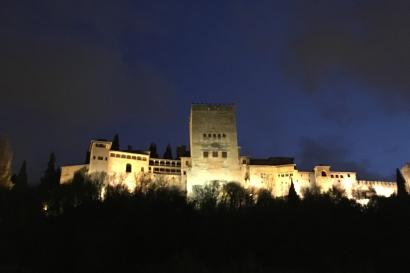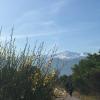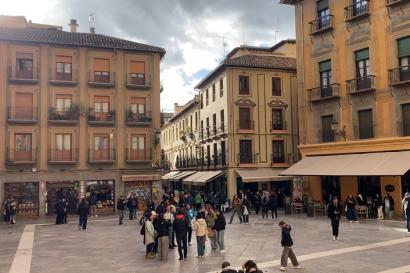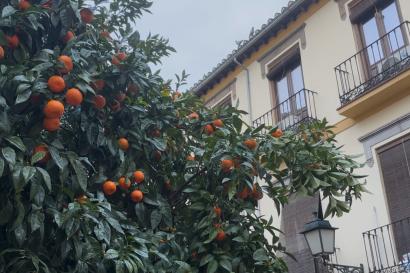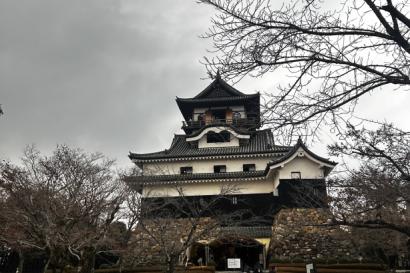IES Abroad: Tell us a bit about yourself and your study abroad blog.
Emily Churchill (EC): My name is Emily and I’m a Spanish & International Studies major at the University of Richmond. In addition to studying abroad in Granada, I have lived in Sevilla, Morocco, and now, Ecuador! I love traveling, writing, singing, playing guitar, and running. When I was considering study abroad programs for my junior year, IES Abroad Granada was at the top of my list. Leading up to my departure, I read every blog post from Granada in order to find tips and suggestions to get the most out of my experience. It was a dream come true to serve as an IES Abroad blogger, and an even bigger honor to receive this recognition!

EC: My favorite post to write was probably, "Becoming granaína...but not too much," because the process of writing it allowed me to reflect on how much I had changed over my time in Spain. The tone of that post is different from some of my others. And it illuminates the process of true immersion and adjustment to Spanish culture. It was a “step back” from some of the pressures of study abroad and an exploration of the beauty of everyday life. Many of my friends reshared that post and told me how much my words resonated with them, which meant the world to me.
IES Abroad: How did serving as a Correspondent impact your experience in Granada?
EC: Serving as Correspondent was one of the highlights of my experience in Granada. Composing weekly blog posts gave me a chance to reflect on all the moments I experienced abroad, whether joyous, bittersweet, or mundane. I have always used journal entries, poetry, and songwriting as means of processing my emotions. But as a Correspondent, I was able to share my musings with friends, family, and strangers. My most rewarding moments were when my peers would mention that they had read my post on “Falling in Love Abroad” or “Balancing Tapas & Homework” and that they appreciated my candidness and advice. As a writer, it’s a humbling feeling. Spending a year away from my family and friends was also difficult. I loved being able to take them along for the journey through my posts. I will always have my blog as a snapshot of the wonderful time I spent in Granada.
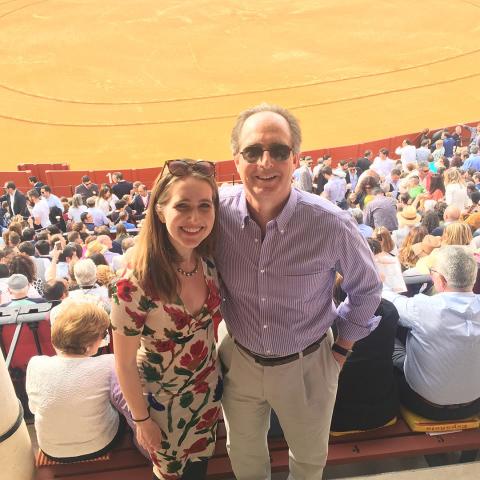
IES Abroad: What blogging tips or tricks do you have for future study abroad bloggers?
EC: Be authentic. Be brave. Be vulnerable. Write only what is true to your experience and not what you think people expect to hear. Don’t worry too much about how each post fits together. If you’re writing from a place of authenticity, your posts will naturally come together in a beautiful way. Also, keep a small journal on you at all times to jot down ideas when inspiration hits. I have stopped on many a public bench in Granada to write blog posts in almost complete entirety as they’ve come to me.
IES Abroad: What are the top reasons to study abroad in Granada in your opinion? How did your experience in Granada compare to your previous experiences in Spain?
EC: I adored living in Sevilla, Spain. I consider it one of the most beautiful cities in the world, but it lacks that bit of extra magic that you find in Granada. There’s something special about looking up the Alhambra palace each day. It represents a window to another world that so many yearn to remember. This yearning is reflected in Granada’s powerful art, literature, and flamenco. In addition, Granada is a fantastic city for students. There are so many international students here and everything is so accessible - concerts, theatre, art classes, internships, and festivals. It’s a big enough city that you’re never bored, but small enough so that you can make an impact during your time here. And oh yeah, don’t forget about tapas. They’re free and delicious.
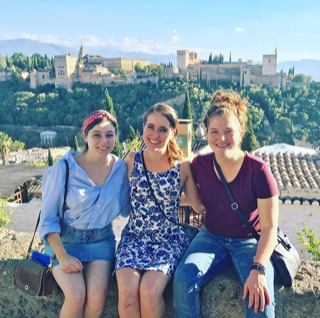
IES Abroad: One thing we particularly enjoyed about your blog was hearing your perspective as an academic year student. How did you decide that you would study abroad for a full year in Granada? How do you think that changed your experience compared to a semester-long experience?
EC: I decided to extend my time in Granada to a full year about halfway through October. It became obvious that I needed more time to fully take advantage of everything Granada had to offer. It was no easy decision. I couldn’t bare the thought of missing a semester with my friends. But I knew I would regret missing out on experiences in Spain more than losing a semester at home.
It’s rare for American students to study abroad for a full year and I wish it was more common. Having spent the past two summers in Sevilla, I thought everything in Granada would fall into place. But you need a full year to sort through feelings of both positive and negative culture shock in order to emerge independent and thriving in your new environment. Spending a full year in Granada allowed me to refine my Spanish, which opened the door to new friendships and professional opportunities. And best of all, it gave me chance to be an IES Correspondent!
IES Abroad: In a couple of your posts, Becoming granaína...but not too much and Steady Wins the Year Abroad, you wrote that you’ve learned a lot about pacing in the past year. What does pacing mean to you? How do you intend to bring this lesson home with you?
EC: Pacing was a key word for me throughout my year in Granada. It is true that Spaniards live a slower-paced life than Americans. But more than that, I learned that experiences and friendships develop more slowly when you are outside of your own culture.
As an American college student, it’s easy to feel as though I’m on an intense, narrow path to success - and that study abroad is just one more step on that journey. But a year in Granada opened my eyes to an entirely different perception of success and pacing. It made me appreciative of everyday triumphs and taught me to set aside time to be spontaneous. If there’s one thing I’ve learned from all of my experiences abroad, it’s that life doesn’t happen unless you make time for it. And almost all of the moments I find worthy of writing about, are the ones that are unplanned. You need to take risks, and above all, you need to take time to reflect.
IES Abroad: How has studying abroad redefined you and your world?
EC: Studying abroad may cause you to reject or retreat into your native culture. However, the more I travel, the more I realize there are multiple ways of viewing the world, of solving similar problems, and of measuring happiness and success. I no longer see myself as a representation of America. I am first and foremost an individual, with all my flaws, quirks, and intricacies. Being American, speaking Spanish, these are just parts of who I am, but they do not define me. My past experiences, my ability to learn from other cultures and connect with others - these are what make me who I am.
I am also cognisant of how privileged I am to take full advantage of the travel opportunities offered by my home university. And I've had the support of my family, professors, and mentors the entire way. I am moved by the stories of several friends who find themselves in Granada due to incomprehensible circumstances. That is why I have decided to donate my prize money for this award to organizations that support Venezuelan and Syrian refugees.
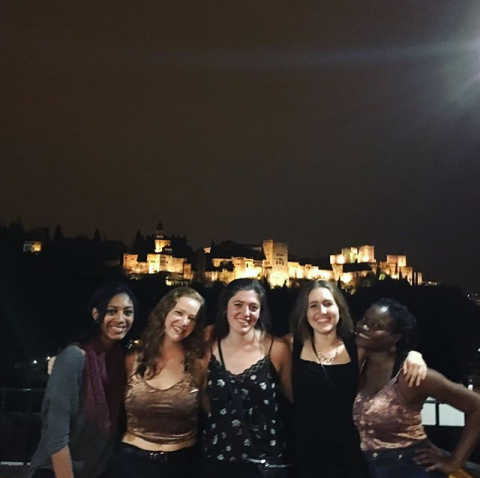
IES Abroad: In your final blog post, you wrote that you were spending the summer in Ecuador. How has that experience been similar or different from your time in Granada? What are your plans or goals moving forward when you return home?
EC: My time in Ecuador has been fantastic! I’m tutoring students in Cuenca on their English writing skills and helping to revise their college entrance essays. I am so grateful to my experience in Granada for giving me the language skills and confidence necessary to succeed in my work here. There may be no free tapas in Cuenca, and Ecuadorians love to make fun of my Andalusian accent when I speak Spanish. But it has been so easy to make local friends and I’ve enjoyed traveling through Ecuador’s diverse landscape.
I am excited to be back home with friends and family this year, but I can’t imagine not speaking Spanish everyday! It has become such a huge part of who I am. I will take this year to finish up my degree, and then I will look for opportunities to work abroad the following year, either in Spain or in Mexico. I eventually want to return to the States to pursue a PhD in Hispanic Studies.

IES Abroad: Anything else you’d like to share?
EC: Tengo que decir mil gracias...to the entire staff of IES Abroad Granada. Thank you for supporting me through every step of my journey this past year. Your passion and work ethic is infectious to all of your students.
And to family, friends, and anyone else who may have read my blog...thank you for taking time out of your day to read my posts and share in my experiences. If you’d like to keep up with my work in Ecuador, you can follow my new blog here!
https://gringaluza.wordpress.com/
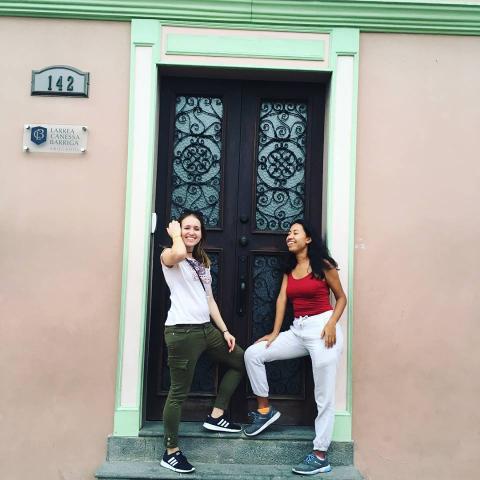
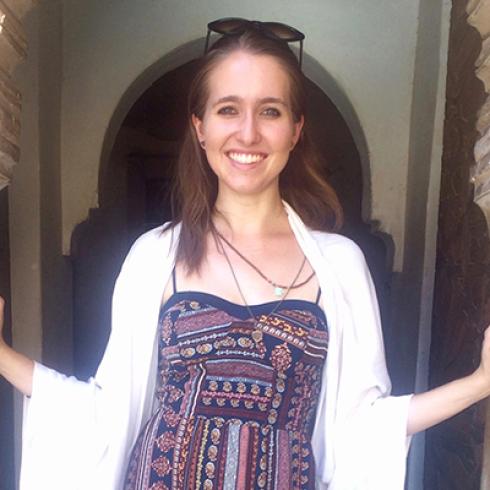
Emily Churchill
Hola caracolas! My name is Emily and I'm studying abroad in Granada, Spain for the 2017-2018 academic year. I'm a Spanish and International Studies major who is always looking for new ways to connect with my beautiful host city. I love to sing, play guitar, act, and have embarked on the journey of writing a historical fiction novel about Granada! In my free time, I love to run and hike in the Sierra Nevada mountains, get lost in the Albaicin, and explore new cafes and tapas bars with my friends. This semester I hope to try my hand at Flamenco guitar, take more siestas, and make even deeper connections with the city and its people.

